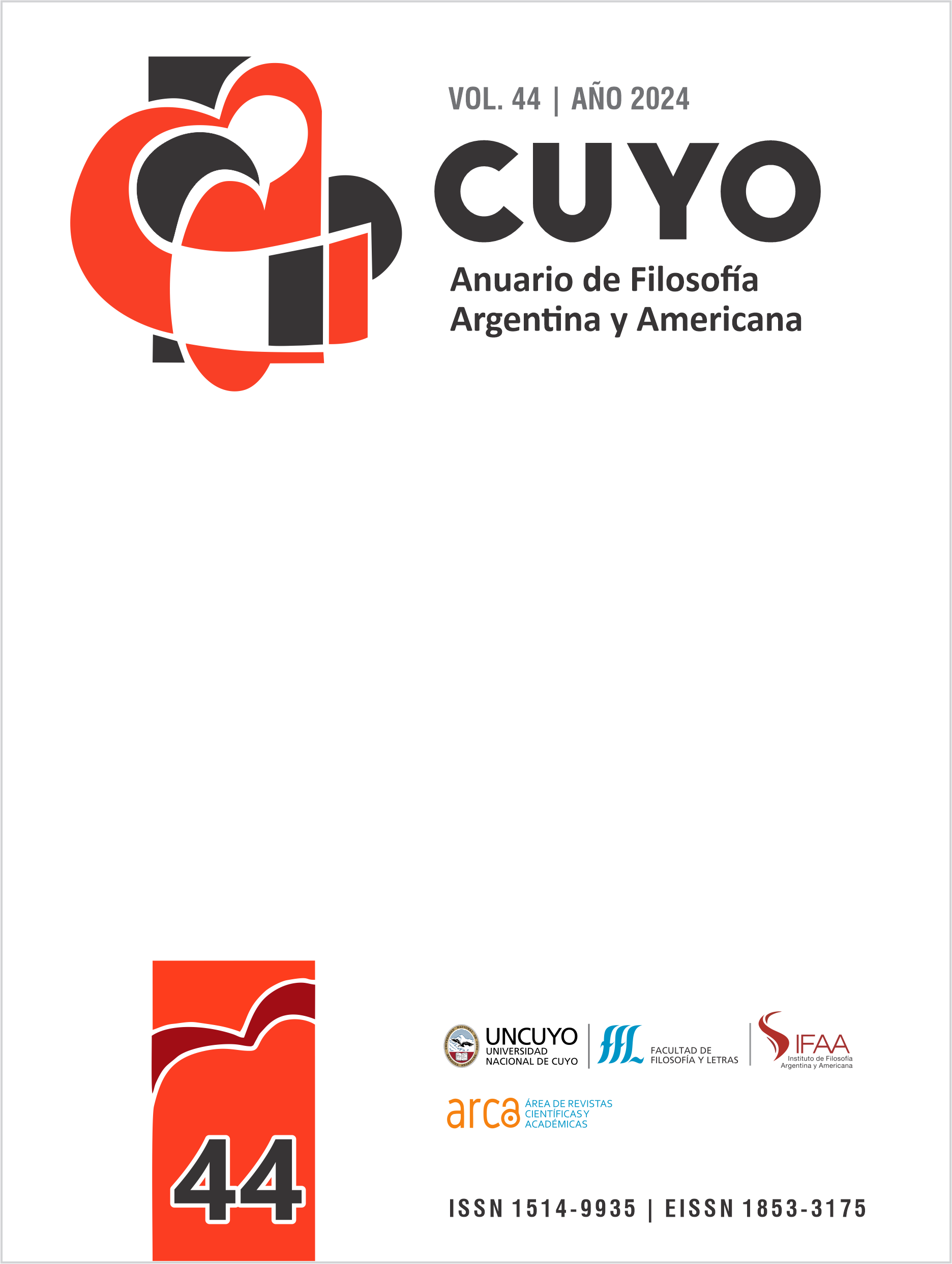Alteration of Exteriority
On the “New Totality”, Political Subjectivity and Messianic Key in Enrique Dussel. A Debate with Emmanuel Levinas
Keywords:
Totality, exteriority, , new totality, messianism, politics of liberationAbstract
Dussel's challenge to Levinasian ethics was that exteriority as a mere critical place was not enough to think about politics and, therefore, it was necessary to move to another Totality to respond (at a political and economic level) to the demands of the other. Thus, for this perspective, exteriority is understood as a moment that is reinstated in a dialectic that returns to the moment of Totality, although this is postulated as new. We consider it very pertinent to address the problem of the necessary “passage” from ethics to politics, which Dussel had to resolve through a new Totality. However, we believe that this problem should be reopened by reconsidering some elements of the relationship between exteriority and Totality, which Levinas himself raises. Thus, it is essential to raise some questions that allow us a more complex vision of the political interpellation of Levinasian ethics from the Latin American condition of exclusion. The questions are: if ethical exteriority is taken as a starting point for the construction of a new Totality, is “totality” really a correct category? Because a “Totality” that had exteriority as its foundation would not properly have the constitution of a Totality, since what movement or effect would exteriority have on the Totality? And in the so-called “passage” from ethics to politics, don't both exteriority and Totality change their constitution? Faced with these problematizations we see a fundamental axis: that it is necessary to accept that in the passage from ethics to politics a necessary alteration of exteriority is committed. This would imply accounting for the transfiguration that exteriority undergoes to politically confront the Totality.
Downloads
References
Cortés Márquez, Bernardo (2018). La paz como interrupción en E. Levinas. De lo perpetuo a lo eterno. En D. E. García (Ed.), Hacia un amable vivir. Claves para la filosofía de la paz (pp. 29-38). México: Porrúa.
García Ruiz, Pedro E. (2014). Geopolítica y alteridad. Levinas y la filosofía de la liberación de E. Dussel. Isegoría. Revista de Filosofía Moral y Política, (51), 777-792. http://isegoria.revistas. csic.es/index.php/isegoria/article/view/882/883
Derrida, Jacques (1998). Adiós a Emmanuel Levinas. Palabra de acogida. Madrid: Trotta.
Dussel, Enrique (1973a). Para una ética de la liberación latinoamericana I. Buenos Aires: Siglo XXI.
Dussel, Enrique (1973b). Para una ética de la liberación latinoamericana II. Buenos Aires: Siglo XXI.
Dussel, Enrique (2003). Lo político en Levinas (Hacia una filosofía política critica). Signos Filosóficos, (9), 111-132.
Dussel, Enrique (2016). 14 tesis de ética. Hacia la esencia del pensamiento crítico. México: Trotta.
Dussel, Enrique (2022). Política de la liberación III. La crítica creadora. México: Trotta.
Levinas, Emmanuel (1999). De otro modo que ser o más allá de la esencia. Salamanca: Sígueme.
Levinas, Emmanuel (2001). De Dios que viene a la idea. Madrid: Caparrós Editores.
Levinas, Emmanuel (2002). Totalidad e infinito. Ensayo sobre la exterioridad. Salamanca: Sígueme.
Levinas, Emmanuel (2004). Textos mesiánicos. En E. Levinas, Difícil libertad. Ensayos sobre el judaísmo (pp. 85-126). Madrid: Caparrós Editores.
Levinas, Emmanuel (2006). El Estado de César y el Estado de David. En E. Levinas, Más allá del versículo. Lecturas y discursos talmúdicos (pp. 259-273). Buenos Aires: Lilmod.
Levinas, Emmanuel (2013). Escritos inéditos 1. Cuadernos del cautiverio. Escritos sobre le cautiverio. Notas filosóficas diversas. Madrid: Trotta.
Levinas, Emmanuel (2015). Escritos inéditos 2. Palabra y silencio y otros escritos. Madrid: Trotta.
Orospe, Mario (2018). Biopolítica y Liberación. Reflexiones sobre la noción de vida humana en la obra de G. Agamben y E. Dussel. [Tesis de Maestría. Facultad de Filosofía y Letras, Universidad Nacional Autónoma de México]. Repositorio institucional. http://132.248.9.195/ptd2018/junio/0775385/Index.html
Downloads
Published
How to Cite
Issue
Section
License

This work is licensed under a Creative Commons Attribution-NonCommercial-ShareAlike 4.0 International License.
NOTA DE CESIÓN DE DERECHOS
Esta nota de cesión de derechos debe ser completada por todos los autores de colaboraciones aceptadas por CUYO y enviada por correo electrónico a: cuyoanuario@gmail.com
Título del Manuscrito:.....................................................
Declaración
Mediante la presente nota el/los autores otorgamos licencia exclusiva y sin límite de temporalidad para la difusión del manuscrito dentro de la revista titulada "CUYO" que edita el Instituto de Filosofía Argentina y Americana, de la Facultad de Filosofía y Letras, Universidad Nacional de Cuyo, Mendoza, Argentina. Siendo de mi conocimiento que la distribución de la citada revista no es con finalidad lucrativa, sino académica, otorgo/otorgamos la autorización correspondiente para que la difusión pueda efectuarse a través de formato impreso y medios electrónicos, tanto en red local como por vía Internet.
Nombre y firma del autor o los autores:.....................................................................




























